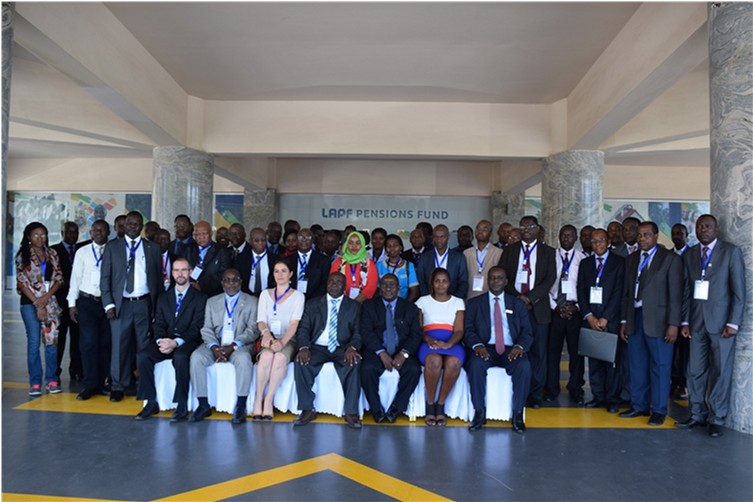The tenth Annual General Meeting of the Eastern and Southern Africa Water and Sanitation (ESAWAS) Regulators Association was held in Dar es Salaam, Tanzania from 1st – 4th November, 2016. The meeting was hosted by the Energy and Water Utilities Regulatory Authority (EWURA) at the New LAPF Pensions Fund Tower, under the theme “Regulating for the Future – Incorporating SDGs”.
The three-day meeting which drew over 70 participants was attended by the eight members of ESAWAS, as well as representatives of the WHO from Ethiopia and Switzerland, Sheppherd and Wedderburn of Scotland, African Forum for Utility Regulators (AFUR), the Kenya Institute for Public Policy Research and Analysis (KIPPRA), WSS Utilities from Nairobi, Lesotho, Maputo, and Rwanda. Local representation was also from the Ministry of Water and Irrigation, the Association of Tanzanian Water Suppliers (ATAWAS), DAWASA, DAWASCO and the Consumer Consultative Council.
The opening was officiated by the Hon. Minister of Water and Irrigation, Eng. Gerson Lwenge. In his opening speech, the Minister said water is at core of sustainable development and core to human health. He noted that the theme has come in first year of implementing SDGs. He further stated that Tanzania remains committed to meeting the SDGs by 2030 and looked forward to healthy cooperation among stakeholders to increase access to Water Supply and Sanitation (WSS).
The meeting was structured around the theme“Regulating for the Future – Incorporating SDGs”. The 2030 Agenda for Sustainable Development is a plan of action for people, planet and prosperity that seeks to build on the Millennium Development Goals (MDGs). Governments world-over have committed to implement the Agenda by 2030, comprising 17 Sustainable Development Goals (SDGs). Despite the strides made under the MDGs, many people on the planet still lack safe water and adequate sanitation. The theme is thus premised on the 1987 UN definition of sustainable development which was defined as “development that meets the needs of the present without compromising the ability of future generations to meet their own needs.” (UN, 1987).
The programme conducted over three-days was as follows:
Day one focused on the theme and included presentations on:
- Incorporating SDGs in Regulation- keynote presentation
- Building Bridges: the role of regulatory authorities in monitoring progress towards the drinking water and sanitation targets of the SDGs.
- Tackling NRW from a National Strategy – a national approach to management of water losses.
- Reducing NRW to Acceptable Benchmarks- in practice.
- Productive Efficiency of Water Service Providers in Kenya- focus on optimal utilization of resources and capacity
- Responding to Climate Change effects- adjusting regulation appropriately
Day two covered presentations on:
- Promoting a Hydro-Nation – collaboration in capacity building
- Promoting Water Safety Planning and Regulation- towards the realization of drinking-water related to SDGs
- Benchmarking Utility Performance across regional countries- improving utility performance by peer comparison
- Improving operational performance in practice – the utility perspective
- Creating a conducive environment for Public Private Partnerships (PPPs) in the provision of WSS services – A case of Tanzania
Day three was dedicated to the Annual General Meeting to discuss business of the ESAWAS Regulators Association.
